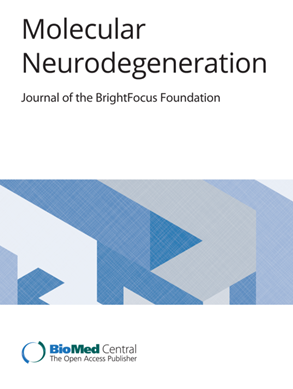α-Synuclein pathology disrupts mitochondrial function in dopaminergic and cholinergic neurons at-risk in Parkinson’s disease
IF 14.9
1区 医学
Q1 NEUROSCIENCES
引用次数: 0
Abstract
Pathological accumulation of aggregated α-synuclein (aSYN) is a common feature of Parkinson’s disease (PD). However, the mechanisms by which intracellular aSYN pathology contributes to dysfunction and degeneration of neurons in the brain are still unclear. A potentially relevant target of aSYN is the mitochondrion. To test this hypothesis, genetic and physiological methods were used to monitor mitochondrial function in substantia nigra pars compacta (SNc) dopaminergic and pedunculopontine nucleus (PPN) cholinergic neurons after stereotaxic injection of aSYN pre-formed fibrils (PFFs) into the mouse brain. aSYN PFFs were stereotaxically injected into the SNc or PPN of mice. Twelve weeks later, mice were studied using a combination of approaches, including immunocytochemical analysis, cell-type specific transcriptomic profiling, electron microscopy, electrophysiology and two-photon-laser-scanning microscopy of genetically encoded sensors for bioenergetic and redox status. In addition to inducing a significant neuronal loss, SNc injection of PFFs induced the formation of intracellular, phosphorylated aSYN aggregates selectively in dopaminergic neurons. In these neurons, PFF-exposure decreased mitochondrial gene expression, reduced the number of mitochondria, increased oxidant stress, and profoundly disrupted mitochondrial adenosine triphosphate production. Consistent with an aSYN-induced bioenergetic deficit, the autonomous spiking of dopaminergic neurons slowed or stopped. PFFs also up-regulated lysosomal gene expression and increased lysosomal abundance, leading to the formation of Lewy-like inclusions. Similar changes were observed in PPN cholinergic neurons following aSYN PFF exposure. Taken together, our findings suggest that disruption of mitochondrial function, and the subsequent bioenergetic deficit, is a proximal step in the cascade of events induced by aSYN pathology leading to dysfunction and degeneration of neurons at-risk in PD.α-突触核蛋白病理学破坏了帕金森病高危多巴胺能神经元和胆碱能神经元的线粒体功能
聚集性α-突触核蛋白(aSYN)的病理堆积是帕金森病(PD)的常见特征。然而,细胞内 aSYN 病变导致大脑神经元功能障碍和退化的机制仍不清楚。aSYN 的一个潜在相关靶点是线粒体。为了验证这一假设,研究人员采用遗传学和生理学方法,在小鼠大脑中立体定向注射 aSYN 预成纤维(PFFs)后,监测黑质髓旁(SNc)多巴胺能神经元和足突神经核(PPN)胆碱能神经元的线粒体功能。12 周后,采用多种方法对小鼠进行研究,包括免疫细胞化学分析、细胞类型特异性转录组分析、电子显微镜、电生理学和基因编码传感器的双光子激光扫描显微镜,以了解生物能和氧化还原状态。除了诱导大量神经元缺失外,SNc注射PFF还诱导细胞内磷酸化aSYN聚集体的形成,这种聚集体选择性地存在于多巴胺能神经元中。在这些神经元中,PFF 暴露降低了线粒体基因的表达,减少了线粒体的数量,增加了氧化应激,并严重破坏了线粒体三磷酸腺苷的产生。与 aSYN 诱导的生物能不足相一致,多巴胺能神经元的自主尖峰运动减慢或停止。PFFs 还能上调溶酶体基因的表达并增加溶酶体的丰度,导致路易样包涵体的形成。暴露于 aSYN PFF 后,在 PPN 胆碱能神经元中也观察到了类似的变化。综上所述,我们的研究结果表明,线粒体功能的破坏以及随之而来的生物能不足,是 aSYN 病理学诱导的一系列事件中的近端步骤,这些事件导致了帕金森病高危神经元的功能障碍和退化。
本文章由计算机程序翻译,如有差异,请以英文原文为准。
求助全文
约1分钟内获得全文
求助全文
来源期刊

Molecular Neurodegeneration
医学-神经科学
CiteScore
23.00
自引率
4.60%
发文量
78
审稿时长
6-12 weeks
期刊介绍:
Molecular Neurodegeneration, an open-access, peer-reviewed journal, comprehensively covers neurodegeneration research at the molecular and cellular levels.
Neurodegenerative diseases, such as Alzheimer's, Parkinson's, Huntington's, and prion diseases, fall under its purview. These disorders, often linked to advanced aging and characterized by varying degrees of dementia, pose a significant public health concern with the growing aging population. Recent strides in understanding the molecular and cellular mechanisms of these neurodegenerative disorders offer valuable insights into their pathogenesis.
 求助内容:
求助内容: 应助结果提醒方式:
应助结果提醒方式:


